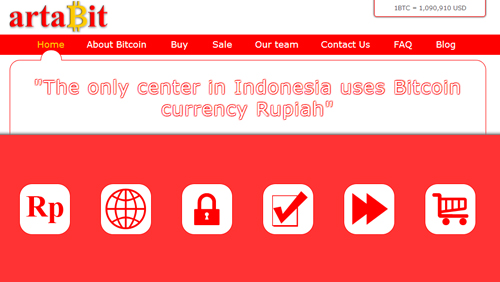 The emergence of Bitcoin as a new digital currency has sparked innovation and startups across all sorts of industries, all around the world. These days it seems that conferences dedicated to innovation and startups include at least one Bitcoin company and New York City’s Ultra Light Startups is a good example of one that did.
The emergence of Bitcoin as a new digital currency has sparked innovation and startups across all sorts of industries, all around the world. These days it seems that conferences dedicated to innovation and startups include at least one Bitcoin company and New York City’s Ultra Light Startups is a good example of one that did.
artaBit founder Ayoub Naciri presented his Bitcoin remittance technology concept to investors at Ultra Light Startups NYC and journalist Morgan Peck released a story on the product. Peck was kind enough to connect me with Naciri so CalvinAyre.com could learn more about artaBit and how Bitcoin is used behind the scenes to offer an affordable remittance technology service to the everyday consumer.
Becky Liggero: Thank you so much for joining me Ayoub, I think you’re truly on to something here. Could you start by explaining the concept behind artaBit?
Ayoub Naciri: To provide an easy, fast and inexpensive way to send money to South East Asia.
Currently, remittance is unnecessarily expensive and inefficient for the trivial movement of money between two points. The remittance business is long overdue for an overhaul.
BL: Agreed and to avoid any confusion before we go too far, can you explain the difference between a remittance technology service and a currency exchange service?
AN: Each of these services uses a different aspect of Bitcoin. An exchange sees Bitcoin as a tradable currency. It can be exchanged in order to make purchases in Bitcoins or simply for speculative reasons.
A remittance technology service like artaBit uses Bitcoin exclusively as a payment network were neither remitter nor receiver is exposed or even needs to be aware of the existence of Bitcoin.
BL: That’s a great way to put it- neither the remitter nor the receiver needs to be aware of Bitcoin. Very interesting. So in your opinion, what scale of opportunity is there for Bitcoin within the global remittance market?
AN: The biggest opportunity we see is in the developing world. Bitcoin efficiently cuts through many unnecessary intermediate steps. The lower infrastructure requirement needs of Bitcoin has the advantage of being able to penetrate in areas with underdeveloped infrastructure. Remittance has traditionally been viewed as flowing from rich countries to poorer countries; Bitcoin makes it feasible to establish transfer links within developing countries such as those between African countries, which are some of the most expensive remittance channels.
BL: Ok, so what are some of the most popular money transfer services available at present and what types of fees are we talking about?
AN: The better known brands are Western Union and MoneyGram, the more economic options to transfer money can take several days to reach the destination. For delivery within minutes, fees with these services can reach in excess of $85 for under $1,000 remittances.
In general, remittance fees have been going down worldwide, for smaller amounts however the fees have stayed persistently high.
RL: Got it. I’m sure it has something to do with fees, but could you elaborate on the benefits of using a remittance technology service such as artaBit over companies such as Western Union?
AN: For large remittance sizes, e.g. $10,000, the services are similar, for small amounts (under $1,000) artaBit can easily provide a cheaper and faster alternative. The cost structure of traditional services makes it prohibitive to send small amount of money. For example to send within minutes $40, the average weekly income of an Indonesian, is over 30% with traditional money transmitter service.
There is an absolute minimum amount that is indirectly imposed with these services,
For example is technically impossible to use MoneyGram express service to send $15 to Indonesia, because everything will go to pay the fees. It would take roughly $20 to send approximately $5. The absolute minimum imposed by artaBit is $1.
RL: I really like this concept. What are the biggest challenges you’re facing while trying to get your product off the ground?
AN: Our operation model is to partner with licensed transmitters in the countries with significant SE Asian immigration, e.g. Singapore, Hong Kong, Taiwan, Malaysia, Gulf states, North America and Europe. Our challenge is to convey to established players how Bitcoin can drastically improve their business in terms of speed and cost. Partnership with companies like artaBit can give them exposure to a disruptive technology with minimum investment on their end.
Regulation in some countries is also a challenge diverting from limited time and resources.
The United States is one of the most cumbersome regulatory environments in the digital currency space. This is causing us to give preference to non-US based transmitters as partners.
 BL: As an American, I understand exactly what you mean from personal experience. So how do you think the United States government will react to emergence of remittance service companies such as artaBit?
BL: As an American, I understand exactly what you mean from personal experience. So how do you think the United States government will react to emergence of remittance service companies such as artaBit?
AN: US regulators are primarily concerned over use of Bitcoin for terrorism or criminal activity. There has been little progress in removing regulatory uncertainty in the US and hardly any effort in ensuring that Bitcoin startups are not being unduly burdened while building their businesses. The unfortunate result has been stifling innovation and driving Bitcoin startups outside the US.
BL: Yes and you’re not alone in that opinion, the same point was made at the Bitcoin London conference in July. Well thank you so much for your time Ayoub, this is a great product you have here- we at CalvinAyre.com wish you the best of luck with getting it off the ground!
